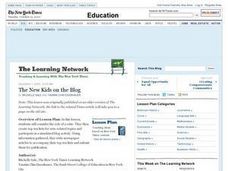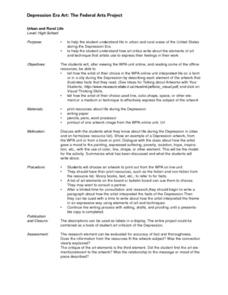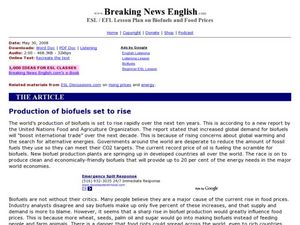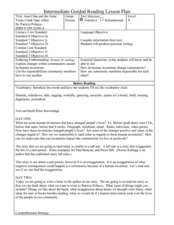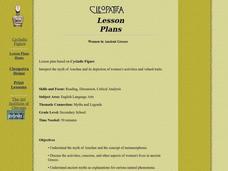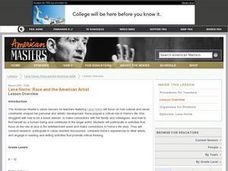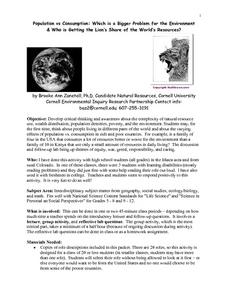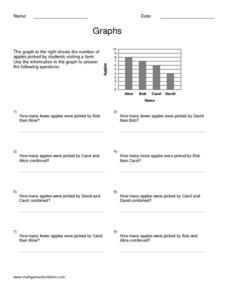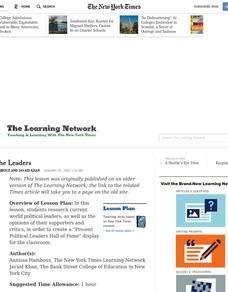National Library of Medicine
Electricity, Frankenstein, and the Spark of Life
Shocking! After viewing a short clip from the 1931 movie, Frankenstein and reviewing electricity references in Mary Shelley's novel, class members examine Luigi Galvani's and Alessandro Volta's observations on electricity and muscle...
National Library of Medicine
Your Environment, Your Health: Runoff, Impervious Surfaces, and Smart Development
Can a sidewalk increase the amount of pollution in local streams? Scholars learn the answer to this question though research and experimentation in the fifth unit in the six-part series. Pupils study runoff, impervious surfaces, and the...
Curated OER
The New Kids on the Blog
Students consider the role of a critic by creating top ten lists for arts-related topics and participate in a simulated blog activity. They write newpaper articles to accompany their top ten lists and submit them for publication.
Curated OER
Depression Era Art
Students choose Depression era art to print out from the Internet. They write paragraphs about how the artists interpreted facts about the Depression in their art. The paragraphs and prints can become a student art critic book.
Curated OER
Breaking News English: Production of Biofuels Set to Rise
In this ESL worksheet, students read or listen to an article about the production of biofuels. Students complete all or some of the 100 activities available here including discussion, listening, vocabulary and comprehension.
Curated OER
Aunt Chip And the Great Triple Creek Dam Affair
Students examine Patricia Polacco's web site as an introduction to her life and literature. They listen to "Aunt Chip and the Great Triple Creek Dam Affair" before discussing how the main character believe in the power of books. They...
Curated OER
The Emperor and the Kite
Fourth graders explore storytelling by reading a classic story. In this vocabulary identification lesson, 4th graders read the story The Emperor and the Kite and define the different vocabulary terms that appear in the story. Students...
Curated OER
Dr. DooRiddles
In this riddle worksheet, 4th graders read the given clues and solve the riddles. Students write the missing word below each riddle on the line provided.
Curated OER
Women in Ancient Greece
High schoolers interpret the myth of Arachne and its depiction of women's activities and valued traits.
Curated OER
Emily Dickinson Poetry
Students identify a poem by Emily Dickinson for analysis. They apply a set of critical questions to a poem in order to interpret poem and find literary elements used by author. They organize information for a PowerPoint presentation...
Curated OER
Lena Horne: Race and the American Artist
Learners examine how race played a critical role in Lena Horne's life. They conduct Internet research, participate in a class debate, write a letter, and create a presentation based on their Internet research.
Curated OER
What Do We Owe To Thoreau?
Students use this design as an electronic reading and writing guide to Henry David Thoreau's famous essay, "On Civil Disobedience." They use activities to familiarize students with the political issues of Thoreau's time. Comprehension...
Curated OER
Shark Attack
Students study the white shark and the red triangle. In this critical thinking lesson students assess the validity of facts about sharks and create a public service announcement either promoting shark or human protection.
Curated OER
Slums in the Spotlight: Will the Millennium Development Goals’ Target be Met?
Students examine the conditions of slums in the world. In this critical thinking skills lesson, students compare the places that people live in the world as they view scenes from the film "Slumdog Millionaire." Students also examine...
Curated OER
Acts of Defiance?
Learners contemplate, discuss and share responses to critical and analytical questions regarding impending war in Iraq. They write persuasive essays arguing the pros and cons of the United States waging war unilaterally.
Curated OER
Getting the Message: What Did You Say?
Students listen to and compare the first sentence of the Gettysburg Address spoken in different languages. They also compare frequency readings for each and discuss how the brain interprets spoken words.
Curated OER
Island Survival
Students participate in a simulation of life on a deserted island. They work with their group to develop an island survival plan and summarize it in a journal. Students use a worksheet and challenge cards to earn points. They will be...
Curated OER
Some People Just Don't Get It
In this daily mind builders activity, students use inferential reasoning and deduction. Students read a short passage and respond to 6 short answer questions stating their own opinion and providing evidence to support their...
Curated OER
Literary Wizardry
Students discuss what they already know about the Harry Potter series. After reading an article, they examine a critic's reaction to the latest book in the series. As a class, they brainstorm what parts of their school day could use...
Curated OER
Population Vs Consumption: Which is a Bigger Problem for the Environment & Who is Getting the Lion's Share of the World's Resources?
Students develop critical thinking and awareness about the complexity of natural resource use, wealth distribution, population densities, poverty, and the environment. They think about people living in different parts of the world and...
Curated OER
Graphs
In this graphing activity, students read information and study diagrams about graphing. Students complete 3 graphing activities.
Curated OER
If I Could Talk Like the Animals. . .
Students read and discuss a film review of the animated movie Antz and then write a monologue from the perspective of a non-human organism.
Curated OER
Stephen Crane's "The Open Boat"
Students critically examine the relationship of man and nature in Stephen Crane's "The Open Boat." students examine the third person point of view and conduct in-depth character analysis.
Curated OER
Follow the Leaders
Students research current world political leaders, as well as the opinions of their supporters and critics, in order to create a "Present Political Leaders Hall of Fame" display for the classroom.


